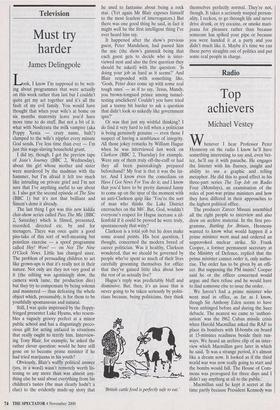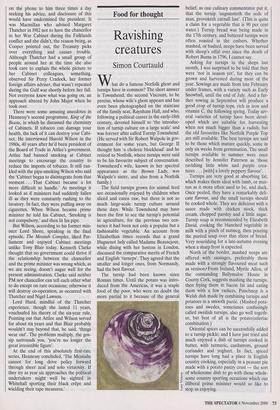Radio
Top achievers
Michael Vestey
Whenever I hear Professor Peter Hennessy on the radio I know he'll have something interesting to say and, even bet- ter, he'll say it with panache. He engages the listener with his fluency, insight and ability to use a graphic and telling metaphor. He did this to good effect in his three-part series The Top Job on Radio Four (Mondays), an examination of the roles of post-war prime ministers and how they have differed in their approaches to the highest political office.
The producer Zareer Masani assembled all the right people to interview and also drew on archive material. In the first pro- gramme, Battling for Britain, Hennessy wanted to know what would happen if a prime minister went mad and ordered an unprovoked nuclear strike. Sir Frank Cooper, a former permanent secretary at the Ministry of Defence, replied that the prime minister cannot order it, only autho- rise. The order has to be given by an offi- cer. But supposing the PM insists? Cooper said he or the officer concerned would argue and then refuse and he would have to find someone else to issue the order.
We haven't had a prime minister who went mad in office, as far as I know, though Sir Anthony Eden seems to have been unhinged before and during the Suez debacle. The nearest we came to 'authori- sation' was the 1962 Cuban missile crisis when Harold Macmillan asked the RAF to place its bombers with H-bombs on board at 15-minutes readiness beside their run- ways. We heard an archive clip of an inter- view which Macmillan gave later in which he said, 'It was a strange period, it's almost like a dream now. It looked as if the third world war was now really going to start and the bombs would fall. The House of Com- mons was prorogued for three days and I didn't say anything at all to the public.'
Macmillan said he kept it secret at the time partly because President Kennedy was on the phone to him three times a day seeking his advice, and disclosure of this would have undermined the president. It was Macmillan who advised Margaret Thatcher in 1982 not to have the chancellor in her War Cabinet during the Falklands conflict and she didn't, the reason being, as Cooper pointed out, the Treasury picks over everything and causes trouble. Although Thatcher had a small group of people around her at the time she also took care to explain the whole picture to her Cabinet colleagues, something, observed Sir Percy Cradock, her former foreign affairs adviser, that wasn't repeated during the Gulf war shortly before her fall. Not everyone knew what was going on, an approach altered by John Major when he took over.
There were some amusing anecdotes in Hennessy's second programme, King of the Beasts, in which he discussed the chemistry of Cabinets. If tobacco can damage your health, the lack of it can destroy your Cabi- net. He interviewed Harold Wilson in the 1980s, 40 years after he'd been president of the Board of Trade in Attlee's government. Attlee had banned smoking at Cabinet meetings to encourage the country to reduce the imports of tobacco. It still ran- kled with the pipe-smoking Wilson who said the 'Cabinet began to disintegrate from that moment . . . That Cabinet became a lot more difficult to handle.' At meetings it looked as if ministers had suddenly fallen ill as they were constantly rushing to the lavatory. In fact, they were puffing away on cigarettes. When Wilson became prime minister he told his Cabinet, 'Smoking is not compulsory,' and then lit his pipe.
But Wilson, according to his former min- ister Lord Shore, speaking in the final episode, The Messiah Complex, liked Par- liament and enjoyed Cabinet meetings unlike Tony Blair today. Kenneth Clarke thought that no government could thrive if the relationship between the chancellor and the prime minister was wrong which, as we are seeing, doesn't augur well for the present administration. Clarke said neither PM nor chancellor can tell each other what to do except on rare occasions; otherwise it will destroy co-operation, as occurred with Thatcher and Nigel Lawson.
Lord Hurd, mindful of the Thatcher experience, though she lasted 11 years, vouchsafed his theory of the six-year rule. Pointing out that Attlee and Wilson served for about six years and that Blair probably wouldn't stay beyond that, he said, 'things wear out'. The problems multiply, the gos- sip surrounds you, 'you're no longer the great irresistible figure'.
At the end of this absolutely first-rate series, Hennessy concluded, 'The Messiahs cannot for long drive policy forward through sheer zeal and solo virtuosity. If they try as year six approaches the political undertakers might well be sighted in Whitehall sporting their black crêpe and wielding their tape measures.'



























































































 Previous page
Previous page